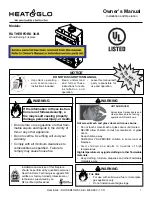
INSTRUCTIONS OF USE
13
3.
3.3.
Lighting
Use of the appliance in warm weather
(warm days, early hours of the afternoon
on sunny days) may lead to lighting and
updraught problems.
Certain weather conditions, such as fog,
ice, humidity entering the flue, etc., may
hinder sufficient updraught in the flue and
lead to suffocation.
Proceed as follows in order to light the
appliance satisfactorily:
•
Open the firebox door(s) and
open all the firebox air-intake
inlets to the full.
•
Place paper or a firelighter and
some wood chips in the firebox.
•
Light the paper or firelighter.
•
Leave the door slightly ajar, the
width of two or three fingers,
for about 15 minutes until the
glass warms up.
•
The first time the appliance is
lit, the fire should be gentle to
allow the parts of the appliance
to dilate and dry.
Important:
The first time it is lit up, the
appliance may give off smoke and strange
smells. This is not a cause for concern.
Open an outdoor window to ventilate the
room during the first few hours of
operation.
If you notice water around the
appliance, this is produced by the
condensation of the moisture in the wood
on lighting the fire. This condensation will
no longer appear when the appliance has
been lit three or four times and has
adapted to its flue. If it does not disappear,
then check the flue draught (length and
diameter of the flue, flue insulation,
airtightness) and the humidity of the wood
used.
3.4.
Safety
Do not store combustible materials
beneath the appliance.
3.5.
Loading fuel
In order to load firewood, open the
firebox door gently, preventing the sudden
entry of air to the firebox so that smoke
does not enter the room that the appliance
is installed in.
We do not advise carrying on the stove
more than 2.6 kg of firewood loads (these
are the loads for which the appliance is
certified). Making larger loads in the
fireplace, may lead to faster deterioration
in the stove and therefore, reduce its useful
life
.
Perform this operation with the glove to
prevent burns to the hands.
The minimum interval between loads
for nominal heat output is 60 minutes.
Always load with the nominal amount
(see table in section 1.1).
For minimum burning (e.g. at night), use
thicker logs.
When the firebox is loaded, close the
door.
Summary of Contents for Sagra
Page 1: ...Sagra Instruction Book ...
Page 12: ...INSTRUCTIONS OF USE 11 3 Figure No 7 Grilles and deflector placed inside the fireplace ...
Page 20: ...DECLARATION OF PERFORMANCE 19 7 DECLARATION OF PERFORMANCE ...
Page 21: ...DECLARATION OF PERFORMANCE 20 7 ...
Page 22: ...CE MARK 21 8 CE MARK ...
Page 23: ......










































